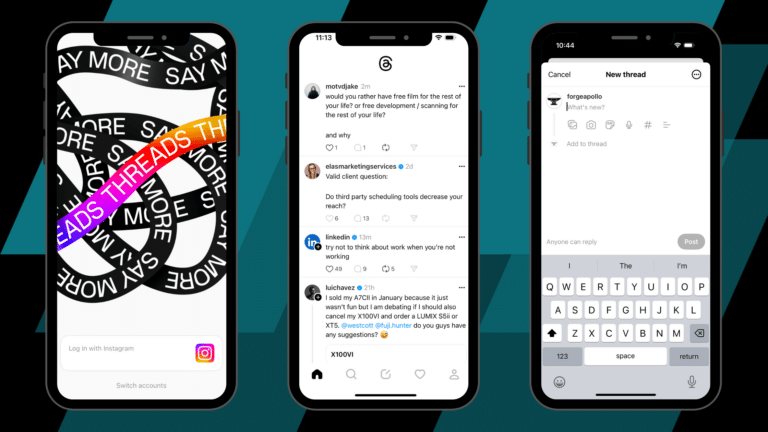With the development of AI chat programs like ChatGPT, Bing’s search AI, and Google’s Bard, many people have questions about the future of AI in marketing.
How does AI chat factor into marketing efforts? Can AI produce marketing collateral? Will AI replace copywriters?
The digital marketing experts at Forge Apollo dove into everything AI chat to answer those questions.
What is AI Chat?
AI chatbots use artificial intelligence to understand natural language and respond to users with helpful information in a conversational way. Machine learning allows them to learn over time and improve future answers.
Recent natural language processing (NLP) technology improvements allow AI chat to understand complex requests and respond accordingly. Users can reference earlier conversation parts, and the chatbot will respond accordingly.
What is AI Copywriting?
AI copywriting uses AI to generate copy in a specified format. For example, a user could ask an AI chatbot to write a 1000-word article about a specific topic.
Some marketers use a combination of AI chatbots and other AI tools to generate their copy.
However, practical and ethical considerations make this an inefficient plan to scale a department.
Will AI Replace Copywriters?
AI copywriting is unlikely to replace human copywriters at scale for several reasons. While Google doesn’t strictly ban AI-generated content, it does require “helpful, reliable, people-first content” that follows search guidelines.
Human copywriters bring the creativity and critical thinking skills necessary to produce original, accurate content that AI chat can’t measure up to yet.
For example, Alan Alda challenged AI to write a new “M*A*S*H” scene, and the dialogue it produced was “hollow” and “leaden.”
Data Accuracy
AI chat responses synthesize data from multiple sources. Sometimes the data they reference is inaccurate or misleading because they lack the judgment of whether or not a source is trustworthy.
Other times, artificial intelligence responds with “hallucinations,” which the head of Google Search even cautioned against. These happen when the AI generates a fabricated answer with no factual basis as if it were reality.
Inaccurate data makes marketing collateral ineffective and misleading. This can mislead readers dangerously for industries surrounding life-altering topics like finance and health.
Citation and Duplicate Content
Due to combining data from multiple sources, proper citation by AI is difficult or entirely omitted. That makes it difficult for a human editor to fact-check and introduces ethical dilemmas of appropriate attribution.
Plus, AI-generated copy isn’t necessarily original. Repeated answers introduce the risk of duplicate content, which is unethical and damaging for SEO and potential copyright infringement.
Unhelpful Content
AI learns from the information fed to it. That means it struggles to produce a unique or interesting take on a subject. Google’s Helpful Content Guidelines state that content should not simply repeat what others have said but add value with a new perspective or information.
Creating Prompts
Writing productive prompts to get AI chat to produce the required content is a skill. Without specific instruction, AI is inclined to ramble or generate an answer that’s not specific to the target audience.
To get desired results prompts must be extremely specific.
Critical Thinking and Empathy
While a wealth of input trains AI chatbots like Chat GPT, they lack the critical thinking skills to understand context and relevancy around a given topic.
That leads to content lacking an “expert” point of view that struggles to build authority. Instead, content is more generalized.
While AI-generated content may sound surprisingly human-like, it doesn’t quite hit the marks of creativity and empathy.
Without a human’s critical thinking skills and creativity in writing, content can present dry and disconnected from the target audience.
For those still unsure of AI chat’s role in copywriting, ask Chat GPT itself.

4 Ways to Use AI to Support Digital Marketing
Rather than replacing copywriters or SEOs with AI chat tools, there are several ways to support these roles with AI.
Generally, writers and SEOs can use AI to spark ideas and get a project started. But the final product requires human influence.
1. Brainstorming
Asking AI chat for a list of ideas for keywords and topics to get the brainstorming started. The ideas provided will be pretty general, so it’s best for beginning-stage brainstorming.
2. Drafting Article Titles and Meta Descriptions
AI chat doesn’t always hit the mark for these elements, but it can provide a good starting point with a specific enough prompt. This can help speed up repetitive tasks.
3. Generating an Initial Outline
Use AI to generate an initial outline for an article. While it may not exactly hit the mark, it can provide a solid start for a writer to work off of.
4. Adapting Copy for Different Purposes
If a copywriter completes an article and wants to present the same ideas in an email their sales team can use, try asking AI to write one based on it.
We tested this out. The result was content-heavy and required editing. But again, if this were something a company wanted to do at scale, it would speed up the process.
The Future of AI Chat in Digital Marketing
AI chat will impact digital marketing in the next few years. If nothing else, careful SEO management will be necessary as people flood the internet with poorly produced AI-generated content. However, the data inaccuracies, duplicate content, and lack of the human element make AI chat a poor option to replace human copywriters and SEOs. For high-quality, original copywriting, turn to the digital marketing experts at Forge Apollo in Philadelphia. Contact us today to learn more about our SEO and content writing services.







